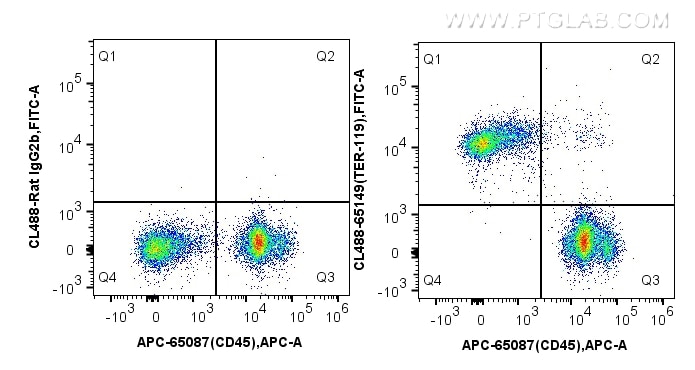Validation Data Gallery
Tested Applications
| Positive FC detected in | mouse bone marrow cells |
Recommended dilution
| Application | Dilution |
|---|---|
| Flow Cytometry (FC) | FC : 5 ul per 10^6 cells in 100 μl suspension |
| This reagent has been tested for flow cytometric analysis. It is recommended that this reagent should be titrated in each testing system to obtain optimal results. | |
| Sample-dependent, Check data in validation data gallery. | |
Product Information
CL488-65149 targets TER-119 in FC applications and shows reactivity with Mouse samples.
| Tested Reactivity | Mouse |
| Host / Isotype | Rat / IgG2b, kappa |
| Class | Monoclonal |
| Type | Antibody |
| Immunogen |
Day-14 fetal liver cells from a C57BL/6 mouse 相同性解析による交差性が予測される生物種 |
| Full Name | lymphocyte antigen 76 |
| Gene Symbol | TER-119 |
| Gene ID (NCBI) | 104231 |
| RRID | AB_2883206 |
| Conjugate | CoraLite® Plus 488 Fluorescent Dye |
| Excitation/Emission maxima wavelengths | 493 nm / 522 nm |
| Form | |
| Form | Liquid |
| Purification Method | Affinity purification |
| Storage Buffer | PBS with 0.09% sodium azide and 0.5% BSA{{ptg:BufferTemp}}7.3 |
| Storage Conditions | Store at 2-8°C. Avoid exposure to light. Stable for one year after shipment. |
Background Information
TER-119 is a mouse erythroid lineage-specific monoclonal antibody that reacts with erythroid cells at differentiation stages from early proerythroblast to mature erythrocyte, but not with cells showing typical erythroid blast-forming unit (BFU-E) and erythroid colony-forming unit (CFU-E) activities (PMID: 1975515; 10848813). TER-119 recognizes a 52-kDa molecule on erythrocyte membranes (PMID: 10848813). TER-119 antigen is a molecule associated with cell-surface glycophorin A but not with glycophorin A itself (PMID: 10848813).
Protocols
| Product Specific Protocols | |
|---|---|
| FC protocol for CL Plus 488 TER-119 antibody CL488-65149 | Download protocol |
| Standard Protocols | |
|---|---|
| Click here to view our Standard Protocols |

